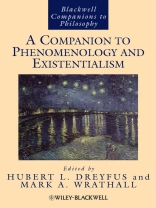A Companion to Phenomenology and Existentialism is a
complete guide to two of the dominant movements of philosophy in
the twentieth century.
* Written by a team of leading scholars, including Dagfinn
Føllesdal, J. N. Mohanty, Robert Solomon, Jean-Luc Marion
* Highlights the area of overlap between the two movements
* Features longer essays discussing each of the main schools of
thought, shorter essays introducing prominent themes, and
problem-oriented chapters
* Organised topically, around concepts such as temporality,
intentionality, death and nihilism
* Features essays on unusual subjects, such as medicine, the
emotions, artificial intelligence, and environmental
philosophy
Inhaltsverzeichnis
List of Illustrations viii
Notes on Contributors ix
Acknowledgments xiv
1 A Brief Introduction to Phenomenology and Existentialism
1
Mark A. Wrathall and Hubert L. Dreyfus
PART I PHENOMENOLOGY 7
MAIN MOVEMENTS 8
2 Husserlian Phenomenology 9
Steven Crowell
3 Existential Phenomenology 31
Mark A. Wrathall
4 French Phenomenology 48
François-David Sebbah
CENTRAL CONCEPTS 68
5 Intentionality 69
J. N. Mohanty
6 Consciousness 78
Charles Siewert
7 The Lifeworld and Lived Experience 91
Martin Jay
8 Husserl’s Reductions and the Role They Play in His
Phenomenology 105
Dagfinn Føllesdal
9 Categorial Intuition 115
Dieter Lohmar
10 Temporality 127
John B. Brough and William Blattner
PART II EXISTENTIALISM 135
MAIN MOVEMENTS 136
11 The Roots of Existentialism 137
Hubert L. Dreyfus
12 German Existence-Philosophy 162
Udo Tietz
13 Religious Existentialism 188
Clancy Martin
14 French Existentialism 206
Robert Wicks
CENTRAL CONCEPTS 228
15 The Concept of Authenticity 229
Taylor Carman
16 Affectivity 240
Béatrice Han-Pile
17 The Body 253
Piotr Hoffman
18 Freedom and Responsibility 263
Frederick A. Olafson
19 Absurdity 271
David Sherman
20 Death 280
David Couzens Hoy
PART III CONTEMPORARY ISSUES IN PHENOMENOLOGY AND
EXISTENTIALISM 289
21 Emotions in Phenomenology and Existentialism 291
Robert C. Solomon
22 The Egological Structure of Consciousness: Lessons from
Sartre for Analytical Philosophy of Mind 310
Manuel Bremer
23 Phenomenology, Neuroscience, and Intersubjectivity 329
Matthew Ratcliffe
24 The Intrinsic Spatial Frame of Reference 346
Shaun Gallagher
25 Action, the Scientific Worldview, and Being-in-the-World
356
Craig De Lancey
26 Phenomenology in Artificial Intelligence and Cognitive
Science 377
Daniel Andler
27 Phenomenological Currents in Twentieth-Century Psychology
394
Frederick J. Wertz
28 Medicine 412
Fredrik Svenaeus
29 Realism, Science, and the Deworlding of the World 425
Peter Eli Gordon
30 Environmental Philosophy 445
Iain Thomson
31 Ontology, Pragmatism, and Technology 464
Shunsuke Kadowaki
32 The Lived-Body and the Dignity of Human Beings 478
Andreas Brenner
33 Sexuality 489
Ann V. Murphy
34 Feminism 502
Sara Heinämaa
35 A Life Worth Living 516
Julian Young
36 The Search for Immediacy and the Problem of Political Life in
Existentialism and Phenomenology 531
Michael Allen Gillespie
37 History and Historicity 545
Charles Guignon
38 Bubbles and Skulls: The Phenomenology of Self-Consciousness
in Dutch Still-Life Painting 559
Wayne M. Martin
39 Mathematics 585
Mark van Atten
Index 600
Über den Autor
Hubert L. Dreyfus is Professor of Philosophy in the Graduate
School at the University of California at Berkeley. His
publications include On the Internet (2001), What
Computers (Still) Can’t Do (Third Edition, 1992),
Being-in-the-World: A Commentary on Division I of
Heidegger’s Being and Time (1991), and Mind over
Machine: The Power of Human Intuition and Expertise in the Era of
the Computer (with Stuart Dreyfus, 1987).
Mark A. Wrathall is Associate Professor of Philosophy at
Brigham Young University. He is the editor of Religion after
Metaphysics (2003), Heidegger Re-examined (with Hubert
L. Dreyfus, 2002), Heidegger, Authenticity, and Modernity
(with Jeff Malpas, 2000), Heidegger, Coping, and Cognitive
Science (with Jeff Malpas, 2000), and Appropriating
Heidegger (with James Falconer, 2000).
Hubert L. Dreyfus and Mark A. Wrathall are also the joint editors
of A Companion to Heidegger (Blackwell, 2005).












